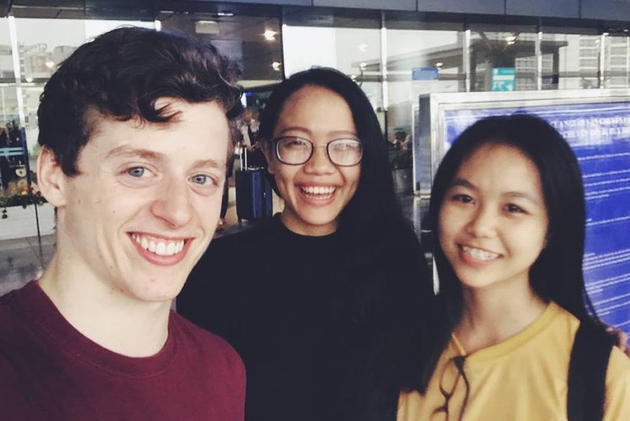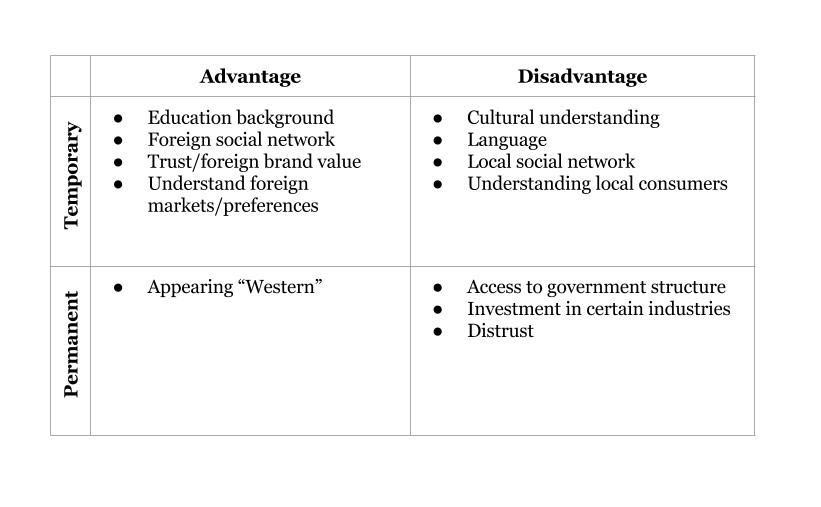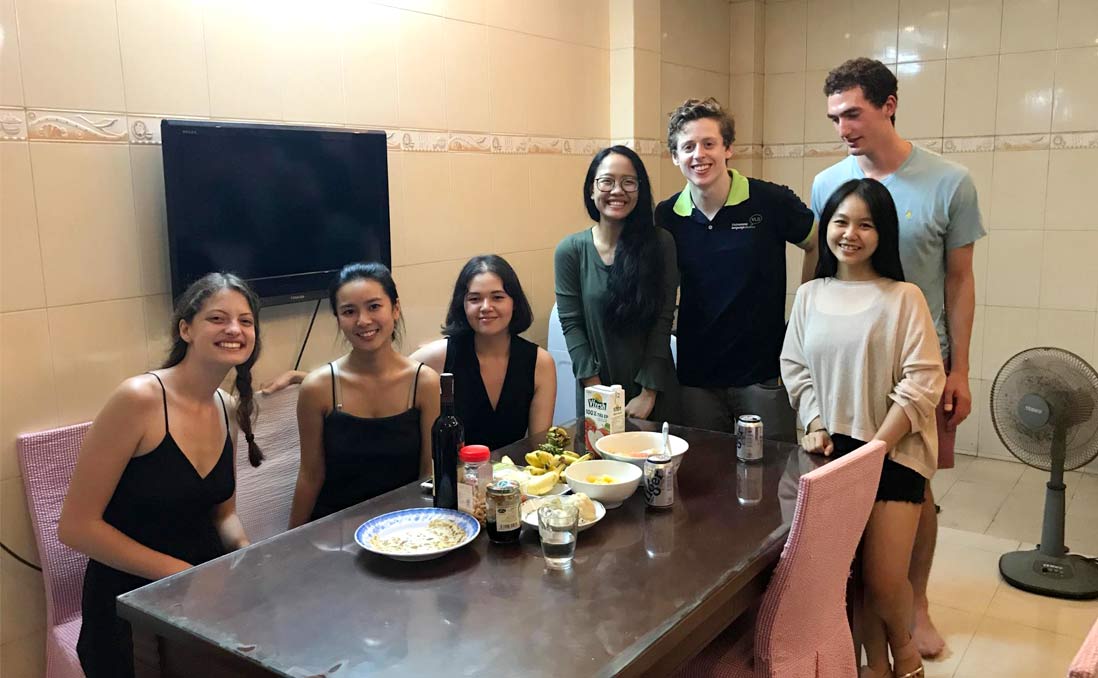Opinion: How Western Entrepreneurs Can Make It in Asia

An initial question for a wannabe-Western entrepreneur would be: "Where in Asia do I want to build a business?" A careless answer could be whichever economy is growing the fastest. However, a more thoughtful approach would consider how fast an economy is expanding and in what way.
Views
Opinion: How Western Entrepreneurs Can Make It in Asia
By Stephen Turban/Crossing ColumnistCrossing@CommonWealth
Imagine this: You're sitting on the back of a motorcycle in Ho Chi Minh City, Vietnam. Your knuckles are white, your face is green, and your eyes are red—bloodshot from the abject fear that this ride may be your last moment on earth.
You look ahead at a pedicab driver who’s staring you down, daring you to collide with his vehicle. You wonder, "Is this the Asian economic miracle that the West talks about?" Your knuckles grip whiter as you begin to look around.
Your first moment in Ho Chi Minh might be characterized by fear. But your second may be characterized by awe: You look up and notice the construction of the 460-meter high Vincom Landmark 81 Tower. You look to the side and see the groundbreaking ceremony for a metro system set to open in 2020. You look down and remember you booked your motorcycle on Grab.
 Two of my Vietnamese friends and travel partners in Vietnam. They often helped me with translation and Vietnamese instruction. (Source: Stephen Turban)
Two of my Vietnamese friends and travel partners in Vietnam. They often helped me with translation and Vietnamese instruction. (Source: Stephen Turban)
How Could a Western Entrepreneur Make It in Rising Asia?
As parts of Asia experience rapid growth, many Western entrepreneurs wonder how they could be part of this exciting development. It's a question that I've been interested in for the past decade. My family is from the US, but growing up, we bounced around Asia Pacific, living in Hong Kong, Singapore, and Taiwan at different times. I graduated from Harvard last May, so I decided to spend the following months trying to answer that question.
The question has led me to Ho Chi Minh City—the economic center of one of the fastest growing Southeast Asian economies. I’ve spent the past few months here interviewing entrepreneurs—from diaper exporters to tech VCs and founders of billion-dollar investment funds. Their stories of success and failure highlight three factors that foreign entrepreneurs should consider: environment, enterprise, and the entrepreneur.
The Environment
An initial question for a wannabe-Western entrepreneur would be: "Where in Asia do I want to build a business?" A careless answer could be whichever economy is growing the fastest.
However, a more thoughtful approach would consider how fast an economy is expanding and in what way. Singapore and Vietnam are both expected to develop further, but their path to growth is fundamentally different.
To understand this, we need to explore one of the most important economic models of the 20th century: the Schumpeterian model of creative destruction.
The Schumpeterian Model: Are You An Imitator or An Innovator?
The Schumpeterian model argues that there are two ways for productivity to increase in a country: imitation and innovation. For economies at "the technological frontier," the only way they can grow is by innovating (i.e. creating new technologies or businesses processes). Think Silicon Valley and tech. For economies that aren’t on the frontier, however, the fastest way to grow is to imitate. Imitation is easier than innovation, but it can’t last forever. As economies approach the frontier, they tend to slow down.
When an entrepreneur looks at entering a foreign market, they should consider where their interest lies. If they're interested in technological innovation, they should find a country that already exists at the frontier. If they're interested in growth, then a developing economy likely provides more opportunities.
With that in mind, it's important to also consider policies toward foreign entrepreneurs and business owners. Countries differ significantly in this regard. Indonesia, for example, provides a laborious process for incorporation, demanding a local resident director (and even locals in some regions) roughly US$300,000 in capital. (Read: Indonesia, Vietnam: Asia's New Economic Stars)
On the contrary, startups in Singapore can set up within a day, with minimal capital stock of less than US$1 (or S$1). What's even nicer is that a company registered in Singapore does not pay corporate tax for its first US$100,000 of profit.
Demographics and Market Scale
I spoke with Walter Blocker, a Kentucky native and the CEO of the Vietnam Trade Alliance. Blocker has lived in Vietnam since the mid-90s and has begun one of the most successful foreign-owned businesses in the nation. At the moment, his Trade Alliance focuses on using data science to refine the supply chain system they've created.
However, this wasn't his business when he first arrived. In 1995, Vietnam's GDP was smaller than New Mexico's (with a population of 1.75 million people at the time). According to Blocker, because the customer segment was so small, he needed to focus on high-margin items, such as imported beauty supplies, to make a profit.
Twenty years later, Vietnam has the fastest growing middle class in Asia. This opened different opportunities, such as moving from high-margin items to items that appeal to a broader consumer base. The scale and scope of the market should influence where entrepreneurs target. If the service or product requires a large, wealthy consumer base, then some markets in Asia will be better than others (e.g. Japan and Korea vs Vietnam and Indonesia).
The Enterprise
Why would a Western entrepreneur want to start up in Asia? Well, they'd have to believe that there are opportunities here that don't exist back home. Specifically, they'd believe that there are market holes that they could fill or that they have specific skill sets that are not widely available.
Barriers to Entry, Information Asymmetry, and Porter's 5 Forces
A useful framework for understanding competitive advantage is the Five Forces by Harvard professor Michael Porter. One of his central insights is that the most profitable firms have high barriers to entry, which allow for less competition.
When we think about barriers to entry, we often imagine physical capital. For example, the airline industry has substantial barriers to entry because it requires significant capital to buy a plane. But for entrepreneurs in developing economies, barriers to entry are usually more about knowledge capital than monetary investment.
Another example is admissions consulting for US colleges. In theory, anyone could enter this market. It requires no capital, tools, or pre-established team. But in Asia, the number of people who have successfully applied to US colleges then returned to help others do the same is remarkably low.
Foreign entrepreneurs have a distinct advantage here: Because the barrier to entry is rather high, there is little competition, leading to consulting firms flourishing across the region. (For a look at one from my class at Harvard, check out Crimson Education.)
Another way to think about competitive advantage is information asymmetry. Which information channels does a Western entrepreneur have that a local competitor does not?
In the mid-90s in Vietnam, a significant example of this was outside investment. Founders like Dominic Scriven, now chairman of a US$1.5 billion investment firm in Vietnam, had access to fundraising networks that local competitors didn’t. In fact, some pieces of evidence suggest that information asymmetry in investments remains. US-raised Eddie Thai is a partner at 500 Startups Vietnam, one of the first Vietnam-focused startup funds. Research suggests that most startup capital remains centered around Silicon Valley, New York, and London. So, investors who have access to those social networks are often international.
Outsourcing Labor for a Western Market
I visited the co-working space The Dreamplex in Ho Chi Minh City. The Dreamplex is part of a growing trend in Asia toward community-based workspaces. The demographics of the co-working space told a story of foreign founders, as roughly 80 percent to 90 percent of founders there were non-Vietnamese. However, more than 50 percent of the employees were Vietnamese. There were foreign founders, but largely Vietnamese teams.
What market are these entrepreneurs trying to enter? For the majority, it's somewhere in the West, often the US or Europe. The reason they've started up in Asia was the cheap cost of living and an inexpensive labor force. For example, the average salary for a recent college graduate in Vietnam is around US$200 to US$400 per month. Vietnamese workers also perform well. The OECD ranks the math and science scores of 15-year-old students above peers in Australia, the UK, and the US.
Unfortunately, little research exists around how to outsource labor for a startup. It's likely that this model has the ability to start up quickly and cheaply, but it may lack the necessary infrastructure or talent pool to grow into a world-class business.
As education levels in technology increase rapidly in Southeast Asia, however, the possibilities for these companies continue to grow. For these enterprises to succeed, however, we need to examine the relationship between the entrepreneur and the teams they lead.
The Entrepreneur
What are the pros and cons for Western entrepreneurs in Asia?
In the disadvantages column, we have the following as significant weaknesses:
● Lack of cultural understanding
● Weak social network
● Language barriers
On the other hand, these advantages can help an entrepreneur:
● Postgraduate education
● Foreign social networks
● Native English language speaker
● And even "appearing foreign"
As many Asian countries develop, however, these advantages and disadvantages will shift. In most developing countries, studying in the US is a distinct educational advantage. Yet, as their economies mature, a growing number of students will have studied abroad and have returned to their country.
Similarly, as educational institutions improve, the comparative advantage of studying abroad will diminish. Vietnam, for example, sent over 50,000 students to study abroad in 2016. That number is projected to increase by nearly 40 percent over the next few years. Similarly, the Vietnamese government is investing heavily in an improved university system.
Entrepreneurs can also overcome many of the disadvantages they face. Let's look at Scriven. Scriven is fluent in Vietnamese, a collector of revolutionary art, and the recent recipient of the Vietnamese Labor Medal. But when he came to Vietnam in his mid-20s, he knew very little about the country. Rather, he focused on developing those skills early on.
Social networks can be built, languages can be learned, and cultural understanding can be acquired. None of this happens quickly, but it's not an inevitable disadvantage that Western entrepreneurs face.
Some advantages and disadvantages are relatively permanent, however. For example, unless a Western entrepreneur is willing to change citizenship, many industries fall outside of their potential reach. State-owned enterprises typically dominate a few sectors such as natural resources. Without access to the party structure, foreign entrepreneurs will have difficulty entering these industries or companies.
Similarly, Westerners do have some social advantages. In some industries like English teaching, hotel management, or entertainment, speaking and looking like a Westerner is an unfortunate but undeniable advantage.
 A hike sponsored by my Vietnamese language school, VLS. (Source: Stephen Turban)
A hike sponsored by my Vietnamese language school, VLS. (Source: Stephen Turban)
Here's a simple way to break all of this down:

A Ticking Clock for Foreign Entrepreneurs
Thai argued that the window of opportunity for foreign entrepreneurs is slowly closing. As you can see in the table above, the advantages that Westerns have are mostly temporary. They come from studying and growing up in an educational environment that is stronger than in most of Asia. However, as more students study abroad and the local higher education system improves, the competitive advantages of foreign entrepreneurs decrease.
During the summer, I met Trang Duong, a young woman who represents this trend exactly. She went to high school at the Phillips Exeter Academy in the US, then went to Brown University. As a senior at Brown, Duong has already founded a social for-profit called Penta, which helps connect amputees in Vietnam with used prosthetics in the US. After graduation, Duong plans to return to Vietnam and has begun scoping out another potential venture in the cacao industry.
At the moment, Vietnam doesn't have many people like Duong. But as more people like her study abroad and return to Vietnam, the advantage of pure Westerners decreases markedly. Not only will these individuals have access to Western social networks, they also understand the local market more than recently relocated Westerners.
 This is a dinner party I hosted for young students, recent graduates, and entrepreneurs. Trang Duong is pictured. (Source: Stephen Turban)
This is a dinner party I hosted for young students, recent graduates, and entrepreneurs. Trang Duong is pictured. (Source: Stephen Turban)
Can a Western Entrepreneur Make It?
Yes—with caveats.
The entrepreneurs I spoke with answered yes, but not forever and not in every industry. Before entering an Asian market, entrepreneurs need to ask two questions:
1. What are their competitive advantages and disadvantages?
2. For how long can they reasonably maintain their edge?
If you're interested in entrepreneurship in Asia and you've weighed the pros and cons, then it's time to take a leap. In Mandarin, there is an expression that mirrors this situation well: 机不可失,时不再来. Translation: Opportunity knocks but once.
The author would like to thank Eddie Thai, Henry Nguyen, Dominic Scriven, Chad Ovel, Trang Duong, Walter Blocker, Ken Watari, Tony Ngoc, and the Dreamplex team for their help, support, and fascinating conversations.
Edited by Sharon Tseng
Additional Reading
♦ How I Tried (and Failed) to Become an Internet Celebrity in Taiwan and China
♦ No Longer an Asian Tiger?
♦ An Italian Entrepreneur Realizing 'His Meaning of Life' in Taiwan
♦ Appealing to Southeast Asian Markets with Taiwanese Quality
About the Author
Stephen Turban is a recent graduate of Harvard College and an alumnus of Jianguo Municipal Highschool. In high school, Stephen lived in Taipei as an exchange student; ever since, he has been writing about his time in Taipei, his experience's learning Mandarin, and his interest in organizations. Stephen's work has appeared in the Harvard Business Review, Slate, and has been cited by Hillary Clinton in speeches. Stephen currently works for McKinsey & Company where he tries to combine data science with questions about human and organizational behavior. In his free time, Stephen studies languages. Stephen is fluent in Mandarin and Spanish and is currently studying Vietnamese. You can follow him on Facebook and Weibo. You can also reach out to him directly at [email protected]

Crossing features more than 200 (still increasing) Taiwanese new generation from over 110 cities around the globe. They have no fancy rhetoric and sophisticated knowledge, just genuine views and sincere narratives. They are simply our friends who happen to stay abroad, generously and naturally sharing their stories, experience and perspectives. See also Crossing Arab World.
Original content can be found at the website of Crossing.
♦ 【雙語】歐美新創的「東向」──來自西方的創業者,要如何在快速崛起的亞洲市場成功?
This article is reproduced under the permission of Crossing. It presents the opinion or perspective of the original author / organization, which does not represent the standpoint of CommonWealth magazine.







